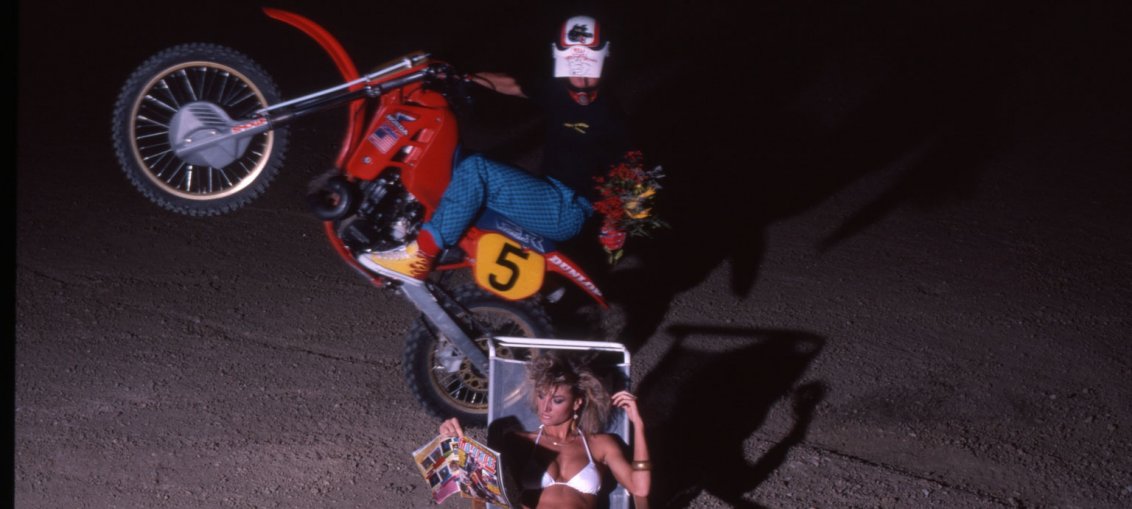
All-American hero Ricky Johnson was one of the biggest global superstars of motocross in the sport’s mid-1980s heyday. He was not only a great champion, but was a star of TV and magazines, turning motocross and Supercross into a huge sport in the USA and beyond.
With his super-aggressive riding style, own clothing line and huge sponsorship deals, he formed the blueprint for the highly-paid superstar riders we have today.
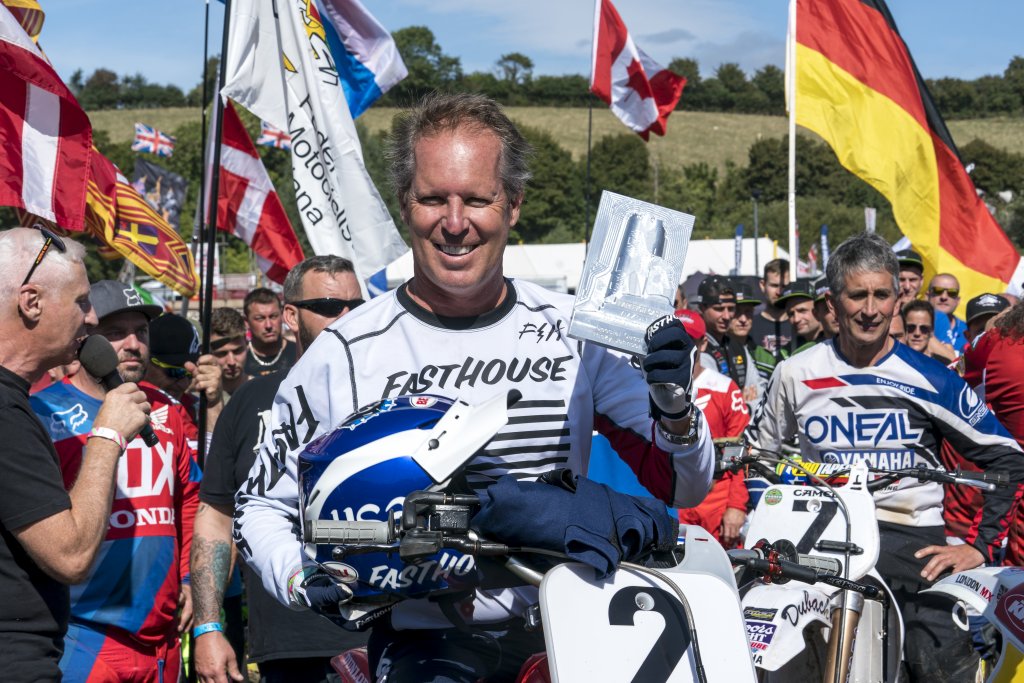
In his glittering career he was on the factory Honda dream team, winning seven AMA Supercross and motocross titles including 63 overall 250 or 500 Nationals or Supercross races. And he led the American team to five of their Motocross and Trophee des Nations victories including the famous 1986 whitewash at Maggiora. He loved taking on the Europeans, and won the American 250 GP three times and the 500 GP at Carlsbad once.
While at the height of his career – the reigning 500 outdoor and Supercross champion of 1988 – a 1989 practice crash saw him destroy his wrist. He battled through the pain for almost two years before finally quitting as he just couldn’t hold on any more. When he retired at age 26, he was the all-time leader in Supercross victories.
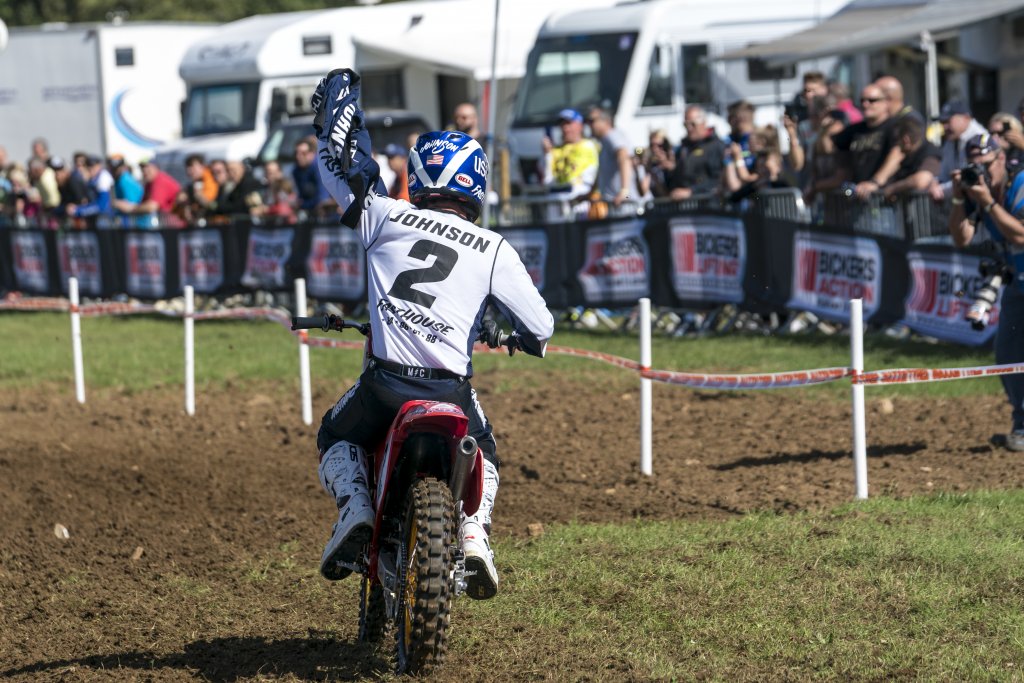
Since then he took up off-road truck racing and has become one of America’ most successful racers. But he still loves motocross and has been a big hit at lots of retro-inspired races, were we caught up with the Californian to hear his views on the sport he loves.
I started riding when I was three years old
My sister had a Taco mini bike with a Briggs and Stratton engine. And I was always crawling all over it when I was just a baby. So when I was three, my dad went to Sears department store and they had a real tiny 1.5bhp mini bike with wings out the side so you couldn’t tip over. I’d ride it up and down the street and it was love. I knew at that age, I’d found my true passion. I’d fall down and get hurt and cry, but I never thought about not doing it again. I just tried to figure out a way to not get hurt. It just felt fun to go fast.
Mini bikes was full of fights and cheating!
The first time I raced was age seven and did two flat track events. The person I went with was called Rick Woods, but he moved away so I stopped racing but kept riding. The coolest thing I ever did was when I was eight years old I rode right across a golf course where people were playing! They were hitting balls at me.
When I was nine I went to a motocross track called Four Corners near Ramona in California to race again. I was dead last but I wanted to go back. Within three months I made it to the 9-11 expert class and won the Southern California championship. When I turned 12 I wanted to get away from mini bikes because there was so much politics, the fathers wanted to fight and there was cheating.

Broc Glover got me onto big bikes
Broc was my neighbour and a good friend as my father made a bike for him to ride in the 100 class. Then he got a factory Yamaha 125 deal and let me practice on his 125. I asked my father if I could race 125s even thought I was only 12 and quite small. I raced, and finished way back again. But I liked the bigger bikes, I liked more power and being able to just hit bigger holes.
My dad said we couldn’t afford to race minis and 125s – it was one or the other. So we sold the mini bikes and bought a 125. And within three months, I went from beginner to professional at age 13, racing Carlsbad, Saddleback, Indian Dunes and Escape Country.
I won in my first National season
When I turned 16 in 1981 I raced Nationals. I won Rookie of the Year and won the last moto of the Nationals that year, too, at Carlsbad. Mark Barnett got hurt and broke his shoulder, Johnny O’Mara won overall but I passed him and won the second moto.
That was the best win of my whole career. I was a 125 privateer on my home track, and I remember going around and seeing my friends and family cheering. I crossed the finish line and I remember thinking I’d won a National, and I deserved to be there. That moment, nobody can ever take away.
In 1982 I was second in the 125 championship and almost won the 250 championship. Then ‘83 was a bad year with dislocated hip and broken collarbone. A year later I bounced back and was 250 National champ and won my first Supercross at Seattle. Then in ‘86 I was SX champ, and a year later 250 and 500 outdoor champion and ‘88 SX and 500 outdoor champ. Then in 1989 I broke my wrist and that was the start of the end. It was a pretty short race career really. Now I race off-road trucks!
I had two nicknames
The first was “Too Hip” which means “Too Cool” or “Too Much” or something like that. There was a radio DJ in California who used to always say: “too Hip, gotta go”. So it became a joke with my mechanic, and I got the name from him. Later on I became “Bad Boy” with the Bad Boy Club line that I launched.
I’m a very bad loser
I became a champion because I had a great example in Broc Glover and I owe a lot to him. He trained and worked very hard and was very successful. When you have someone that close, you can see that if you do what they do, you have a good chance of success. And maybe be better than them. And Broc was there during my whole career.
I think I get my attitude from my mother and father. I hate to lose. I’m a very bad loser, I get very emotional and I’m very hard on myself. I love the battle. I loved battling with Jeff Ward, Ron Lechien, David Bailey, Bob Hannah and Dave Thorpe. I loved to race hard. Winning is good but the battle is important. To race with panache!
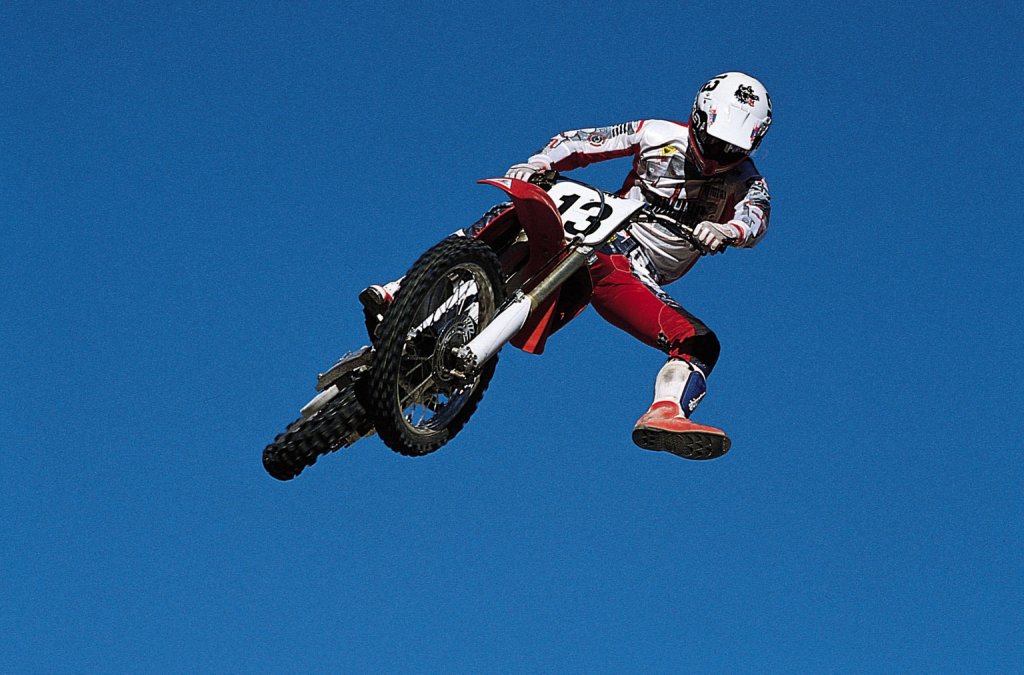
The best battles were ones I lost!
I remember a great battle I had racing with David Bailey, racing with him on his own track at Axton in Virginia. It was one of the toughest. He made no mistakes and I ate his roost all day. He beat me but I was right there all the time.
Then of course was the famous, big battle between us at the Anaheim Supercross in 1986. I wasn’t in good shape as I’d been sick the week before. So the last couple of laps I had to submit. But it was good for my motivation to keep pushing on.
Nobody saw my hardest race
There was a battle with Jeff Ward that nobody ever saw. We were main rivals in the 500 championship and one day I went to practice at the Flower track at Carlsbad. I pulled in and Ward was sat by himself, getting dressed to ride. I looked at him, parked a distance away and got dressed as fast I could could.
We both got on the track, quite a distance apart. But every lap there was one part where as I was coming down a hill, he was next to me going up. Every lap, he’d gain on me a little, then I’d gain on him. I could see blue grooves on the track where we’d been spinning wheels trying so hard. It went on for almost an hour -as fast as we both could go. And none of us wanted the other guy to see them stop.
It carried on until he ran out of gas. He pushed his bike back to the truck and I keep riding. Then I spot him standing and timing me on his stopwatch. I only stopped when he loaded up and drove off.
The mid ‘80s was a golden age
In the ‘80s everything changed as the bikes were became better and better. In the 1970s, you couldn’t ride a motorcycle wide open as you’d break it. Joel Robert, Roger De Coster, Torsten Hallman, John De Soto and Brad Lackey could break the bike so they had to pace themselves.
Also in the 1980s we still had 45-minute motos, so you had young riders realise that if they were strong, they could win. Jeff Ward, Johnny O’Mara, Bob Hannah and Mike Bell trained very hard. And you had David Bailey doing marathons and triathlons. Lechien didn’t train so much but was so fast. Then there were great Europeans like Dave Thorpe, Andre Malherbe and Eric Geboers. Everybody was trying new stuff to be the best. So it was a very good time for a strong aggressive man to make it.
Now with Supercross, I only see a couple of guys who if they get passed, they go really hard to get in front again. Of course, the level of riders and machines is better than when I was racing. Tyres are better, suspension is better. In the old days you’d come into a corner and the wheel would flex and slide away. That’s why they went to upside down forks.

I can read terrain well
My strength was in braking. I could come into corners faster than anyone. I had good technique, but also the ability to see how a track was changing. Sometimes I’d go high on a high line, sometimes low. I can’t spell or read very well, but I can read terrain well! Reading a track is still natural to me. In racing the Baja, I did 380 miles and I can tell you the lines I used for the whole race.
My weak parts were I was easily distracted away from the track with girls and wanting to go surfing. I guess my strength was my Attention Deficit Disorder – but it was also my weakness!
Hannah was arrogant and Lechien was dirty
There’s a difference between angry and motivated. David Bailey and Jeff Ward motivated me the most. Ronnie Lechien and Bob Hannah made me the most angry. Hannah was very arrogant and Lechien was very dirty! If Lechien thought he could break your leg, he’d do it. I had to learn that if I gave him the opportunity to hit me, he would.

I never got to race the best bike
The bike I liked the best was the bike I never got to race. It was the 1985 works bike Honda let me test. I rode it, and said immediately I’d sign for the next year. Then it was gone as from 1986 there were no more works bikes.
That bike was Lechien’s works bike and it was unbelievable. The power was so smooth, the weight balance perfect and it was light. I got on it, they adjusted the handlebars and the sag and I went four seconds a lap faster than on my own bike.
I never liked my 1983 Yamaha works bike. It was difficult to ride and I got hurt on it. It didn’t corner well either. It was light and looked good with all those magnesium and aluminium bits but it was not rider-friendly. I never was comfortable on it.
I was always afraid of failure
I loved the racing but I hated the moments before because of the nerves. I didn’t throw up so much, but was so nervous and afraid of failure and I hated that. As soon as the gate drops, everything was perfect. I was always afraid to fail and let down the factory, mechanics, friends and sponsors. I never wanted them to have to say I lost. I wanted them to be proud of me.
Champions have the ability to adapt
Winners make changes when something goes wrong, like if you get a bad start or your bike makes an odd noise. When you have a bad day, you get fifth. On a good day, you destroy everyone. And champions have the ability to endure pain. Just small pain, like when your legs and lungs are on fire when running. Or getting hit in the face with rocks. Still racing with hurting fingers and knees. You have to be tough to be a champion.
I made a few mistakes
I remember one time racing Jeff Ward on 80s. I was so far in front I relaxed a bit and he passed me on the last corner. My father went mad, and said I should never let off- always race to the finish.
I had one race I was wining at Saddleback and I thought I saw the chequered flag so I pulled off. Everyone was screaming that the race hadn’t finished so I went straight back out but it was too late. Sometimes at Carlsbad they’d run the track backwards. I remember getting the holeshot but rode off the wrong way! I did a U-turn and turned around. So I was never perfect!
Racing Bercy was always so much fun, battling with other riders who you didn’t know. I never realised that in France when the crowd whistle, it’s like booing. I hit Jacky Vimond and everyone was whistling and I thought they were cheering for me. But I noticed the flaggers were giving me the finger which was when I realised whistling wasn’t good!
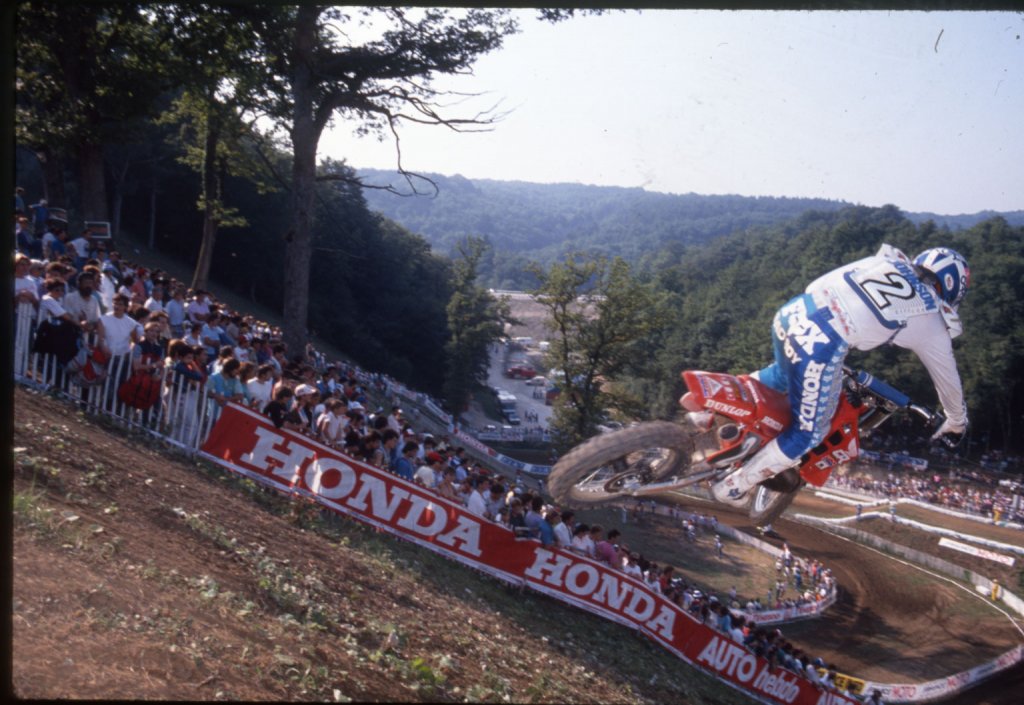
My biggest mistake was breaking a wheel
In 1982 I had a 20-point lead in the 250 championship going into the last round at Castle Rock in Colorado. Honda had given privateer Kenny Keylon a works bike for that race, and I passed him way too fast. I over-jumped, landed too hard and broke my wheel. I got it back to the pits and they put another wheel in but by the end of the race, I’d only got back to 21st and Donnie Hansen took the lead in the championship.
In the final moto, Broc was in the lead and gone. I was in second trying to crash into Hansen who was third! But he stayed away from me and won the title by two points. I cried for the whole 45 minute moto.
I loved beating the best in the world
My biggest satisfaction was being able to race with the best in the world, and some days beat them. Like at the des Nations as a team coming together for America – that was always good. Racing in Texas in 107 degrees and passing Jeff Ward with two laps to go was good, too. As was winning the Carlsbad GP. There are a lot of great moments. I like being recognised alongside those who I think are greats.
I earned good money
When I started racing for Honda, I was on a salary of $125,000. Then it went up because of the championships I won and I was on $350,000 a year basic in 1988 and ‘89. It was a lot of money, but that was just the salary. There was $100,000 bonus for wining a championship and many years I won two. Then I’d go to Europe and do Supercross and one year I earned $100,000 in cash. It’s all gone now! I had a boat, a car… and a nice life.
I always liked lots of different countries
I loved Italy for a lot of reasons – the food and people are passionate about the racing. There is no bullshit with Italians. If they don’t like you, they make it very clear! If they like you, they let you stay in their house and their mother would make you breakfast.
I loved Paris as it was so crazy and so foreign. And there is so much history, walking down the Champs Elysee, going up the Eiffel tower. I loved Holland and Belgium, seeing the old castles. Going to England was like Europe Lite as they spoke English. It was different, but not too much. The perfect starter!
American fans get ugly!
You have to have an open mind as every country has its own traditions. At first, when you’re young, the food can be tricky. In Japan if you’re given octopus on a stick you just go, OK, when in Rome! Japan was great because of the history and everyone is so polite. They come up to you and bring things up for you to sign, and have a gift for you.
In America, the fans always want your shirt or your helmet…. It’s all me, me me. They’re ugly. Not physically – they are lots of pretty girls! I enjoyed all the places, but the place I had the worst times was New York. Back then the spectators would want to fist fight you. They’d either be a Ron Lechien fan or Jeff Ward fan and if they don’t like you they say you suck! I get upset when someone doesn’t like me.
I jumped a VW Beetle 60 feet!
I learned a lot about driving rental car from my Yamaha team-mates Broc Glover and Donnie Cantaloupi. I was in Mexico with Brian Simo, the owner of No Fear. We had surfboards on the roof of a VW Bug and were on a dirt road that would take us to the beach. We weren’t paying attention, and the river had washed a lot of the road away, so there was a big gap. We were flat out, I saw the gap too late to hit the brakes so we took off and landed hard. We jumped it 60 feet out and five feet down. The roof collapsed and there was hot engine oil everywhere, burning my feet. I broke the motor in two, but somehow it kept running. So we had to put oil in it every few miles as it just fell right out.

I’d like to be thought of as a great
When people talk about all-time great riders, it’s tough because how do you measure greatness? You can’t meaure it on duration of career because of injuries. The day that Jeff Ward won the Motocross des Nations in 1984 in Sweden, everyone that was there – Broc Glover, Bailey, O’Mara and myself. Wardy was a great that day. We still talk about it today. He was so fast and did everything so perfectly there was nobody in the world that day who could beat him. I had days – at Daytona or Seattle – when everything was perfect. Nodoby was ever going to touch me.
To be thought of in the top 10 of great riders would be good. For me, if I was strong and healthy I’d take on anyone, any time, from any year. I’d take on Ricky Carmichael, James Stewart, Ryan Villopoto, Roger De Coster, Joel Robert. Maybe I’d have to ride dirty, maybe I’d have to be smart and smooth.
Jean-Michel Bayle was so much faster than me
But he wasn’t stronger than me and didn’t have the heart. So one time at Unadilla he was three seconds in front, then six seconds, then nine, then 12. Then it stayed at 12, then back to nine, then six, then three… I wore him down and won. But everyone is different. You don’t use a hammer for every job. Sometimes you have to use a screwdriver! Get in their mind in practice, maybe in the week, maybe you talk about them and get them upset – Jimmy Weinert style! Get them thinking about something else. Some people, you’d be nice to them and leave them alone. And crush them on the track.
Being on factory Honda was scary
I was fast and aggressive at Yamaha, but the team was having a tough time with the bikes. When I joined Honda, with Roger De Coster, Dave Arnold and Brian Luniss, and Jim Anderson from Showa, I could talk to them and they’d get behind me. They made me better and better.
Being on factory Honda in the 1980s was good, but it was scary. You knew you were on the best team, who gave you everything. One day I called my mechanic Brian Luniss who was in Houston and said I needed him at my house in California the next day, and he did it.
If I wanted to try upside down forks, then compare them against stock forks – there were no complaints. But you know you have to be the best. There is no such thing as second, third or fourth. You have to win.
I loved that feeling of having to be the best. But sometimes it’s very hard and very lonely. At that point, Ward, Bailey and O’Mara were still finding ways they could go faster. So if I had a one-minute lap time one day, the next time I’d have to do 59 seconds, then 58. You’d have to find different ways to go fast. It was a lot of pressure but you were paid a lot to handle the pressure.
Sometimes I thing braking my wrist was a blessing
I would have won a lot more races and won more money. But I look at how my life is today – I’m married to a beautiful woman and being injured forced me to open up to a person. When you’re racing, it’s all about not opening up and letting anyone in. She saw a side of me that nobody saw. She saw me breaking down and asking God why. If I could back and change it, I wouldn’t change a thing.
Ricky Carmichael is not the GOAT
You can’t measure a champion on how many races they won. Nowadays there are so many Supercross races, for example. When I raced, everyone had ankle injuries as our boots weren’t so good and we had skinny footpegs and no knee braces. We were always racing with an injury.
I don’t believe Ricky Carmichael is the GOAT – the Greatest of All Time. He is a great champion, but to say he’s the best of all time – no. He’s too small. He could not have ridden in the 1960s with De Coster and Robert. And his style, he’d break the bike and be injured. He’s the greatest of his time, not of all time. I’m not saying I’m better!
James Stewart is amazing
I honestly think the best rider for technique and speed is James Stewart. He’s not so smart and crashed a lot though. But when it went right, he did things that even I can’t figure out.
When Broc was riding, I could figure out how he did it. Same with Ryan Villopoto or Ryan Dungey. But you watch Stewart sometimes and how he does things and you just go wow – where did that come from? But he doesn’t know when to pull back. You don’t need to win by 10 minutes, just 10 seconds.
Riders today don’t want my help
I still follow all the races and I still teach a lot. Because of my wrists, I don’t ride that much, but I see everything and that’s the one thing I can communicate. I did it for Sebastian Tortelli. He went from sixth to beating Ricky Carmichael at Anaheim one year, setting the fastest lap times and being the fastest rider through the whoops. Then he broke his knee. I know I have the ability to teach.
I ask some riders if they’d like me to help. I’m not after a job, I don’t want money. But many of them just won’t take any advice. I want to see guys succeed but they won’t listen. I offer help to everybody but nobody seems to want to listen,
Perhaps riders think I’m going to compare them to me and tell them about how I used to go through the whoops in 1986. But the bike was softer and more flexy so I couldn’t be as far over the front. It’s so different now.
I’d totally change Supercross
If I was running Supercross, I’d bring back 250 two-strokes as the racing would be better. The 250 has lots of power, they are cheaper to work on and more people would buy them and maintain them themselves. The racing would have more inside passing as the bikes are fast in short bursts, not so swoopy and one line like 450s.
If I had to keep four-strokes, I’d bring down the cc limit. I said to Ricky Carmichael that for the Monster Cup, everyone should ride 250Fs. They stop easier, they feel lighter and the racing would be better.
In a truck racing 20-lap main event, after lap 12 we yellow flag the race, get them all to close up again, then go again. So if you crash in the first turn and work your way up to third, the leader is right there. Now you race to the flag! It’s called Competition Yellow and it makes racing unbelievable. I’d do that in Supercross too.
It’s surprising motocross has not progressed
It has moved on but it should be even further ahead than where it is now. The riders should care more about the sport than themselves. Many riders may disagree, but I feel it’s their jobs to make the sport better for the next generation. Roger De Coster, Joel Robert, Torsten Hallman and Brad Lackey worked hard to make motocross a better place so people like me and Danny La Porte could make a better living and have a nice house and nice car.
They were racing out of the back of a van; it wasn’t about the money. They went everywhere in a suit and tie and were great spokesmen, representing their sport and their country.
Riders today are like robots
Now it’s all about superstars. They win and train hard but it’s 100% about themselves. Are they doing TV shows to show motocrossers are great Americans and great athletes? No. They just work, train, sleep, eat and poop. The sport would be more popular with people outside if the riders worked harder at it.
I was always doing TV. I didn’t really want to – I’d rather sit and relax. But it’s important for everyone that gives you this lifestyle to be that spokesperson. Riders now won’t even do interviews and they are not taking the responsibility of being a champion. Watch Valentino Rossi or Sebastian Vettel. They’ll do an interview in Italian then German then English. American riders just thank Monster, Pro Circuit, Dunlop tyres and the rest. But what does that mean? They’re like robots!
I used to get paid more than anyone as I was on TV and in all the magazines. It should be easy for riders but they won’t do it, they think they’re too busy. But they’re cutting their own throats.
I want to be like De Coster
My son Luke wants to race. It’s time for the young generation for shine and make heroes out of the young riders. I want to be like Roger De Coster was to me. He never made you feel like he was The Man. Even though I treated him with the utmost respect, he always was thinking about how he could make me faster not to tell you how great he was.
Roger did it but Jeremy McGrath didn’t really want to. Jeff Stanton did a bit with Honda and RC does his schools and has a team. But they are still hanging on to who they are. DeCoster is all about making the next champion. Like Eric Geboers. He’s a great team manager. He doesn’t walk around saying he’s five times champion, it’s about the next generation.
I’m living my dream
I try not to live in the past. Sometimes it feels like it was yesterday but other times it feels like it wasn’t even me! I’m just a guy who raced fast and won money in the 1980s. Now I’m just a guy who works hard to pay taxes as our President is messing up the government.
When I ride I can’t twist the throttle so good and I know some people will say I’m too big now or why don’t I go faster. And I don’t care.
From being a little boy on a motorcycle I’ve met President Reagan and Mr Honda, been to France, Italy, England, Sweden, Finland, Mexico, Canada – around the world and be everybody’s guest. I made great friends who are like my family. And all because I rode a motorcycle.
